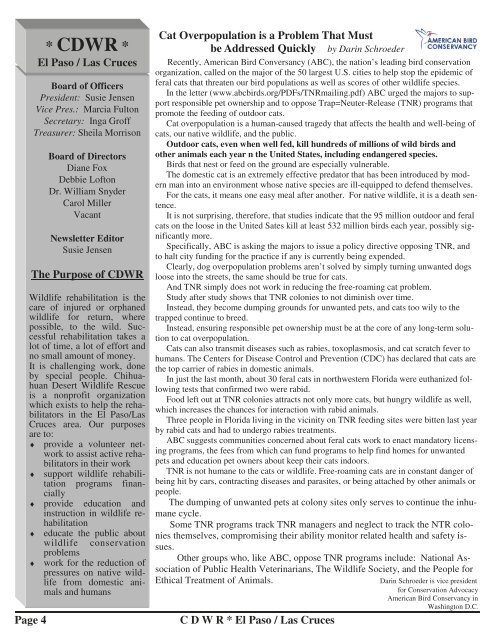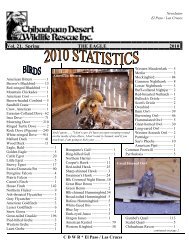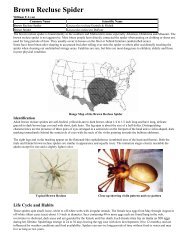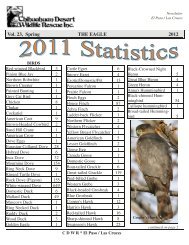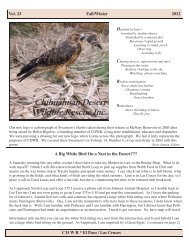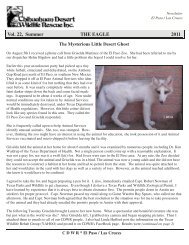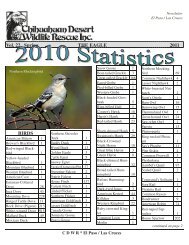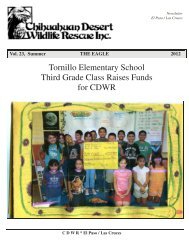Fall/Winter 2011 - Chihuahuan Desert Wildlife Rescue
Fall/Winter 2011 - Chihuahuan Desert Wildlife Rescue
Fall/Winter 2011 - Chihuahuan Desert Wildlife Rescue
Create successful ePaper yourself
Turn your PDF publications into a flip-book with our unique Google optimized e-Paper software.
Board of Officers<br />
President: Susie Jensen<br />
Vice Pres.: Marcia Fulton<br />
Secretary: Inga Groff<br />
Treasurer: Sheila Morrison<br />
Board of Directors<br />
Diane Fox<br />
Debbie Lofton<br />
Dr. William Snyder<br />
Carol Miller<br />
Vacant<br />
Newsletter Editor<br />
Susie Jensen<br />
The Purpose of CDWR<br />
<strong>Wildlife</strong> rehabilitation is the<br />
care of injured or orphaned<br />
wildlife for return, where<br />
possible, to the wild. Successful<br />
rehabilitation takes a<br />
lot of time, a lot of effort and<br />
no small amount of money.<br />
It is challenging work, done<br />
by special people. <strong>Chihuahuan</strong><br />
<strong>Desert</strong> <strong>Wildlife</strong> <strong>Rescue</strong><br />
is a nonprofit organization<br />
which exists to help the rehabilitators<br />
in the El Paso/Las<br />
Cruces area. Our purposes<br />
are to:<br />
♦ provide a volunteer network<br />
to assist active reha-<br />
♦<br />
bilitators in their work<br />
support wildlife rehabilitation<br />
programs financially<br />
♦ provide education and<br />
instruction in wildlife rehabilitation<br />
♦<br />
♦<br />
Page 4<br />
* CDWR *<br />
El Paso / Las Cruces<br />
educate the public about<br />
wildlife conservation<br />
problems<br />
work for the reduction of<br />
pressures on native wildlife<br />
from domestic animals<br />
and humans<br />
Cat Overpopulation is a Problem That Must<br />
be Addressed Quickly by Darin Schroeder<br />
Recently, American Bird Conversancy (ABC), the nation’s leading bird conservation<br />
organization, called on the major of the 50 largest U.S. cities to help stop the epidemic of<br />
feral cats that threaten our bird populations as well as scores of other wildlife species.<br />
In the letter (www.abcbirds.org/PDFs/TNRmailing.pdf) ABC urged the majors to support<br />
responsible pet ownership and to oppose Trap=Neuter-Release (TNR) programs that<br />
promote the feeding of outdoor cats.<br />
Cat overpopulation is a human-caused tragedy that affects the health and well-being of<br />
cats, our native wildlife, and the public.<br />
Outdoor cats, even when well fed, kill hundreds of millions of wild birds and<br />
other animals each year n the United States, including endangered species.<br />
Birds that nest or feed on the ground are especially vulnerable.<br />
The domestic cat is an extremely effective predator that has been introduced by modern<br />
man into an environment whose native species are ill-equipped to defend themselves.<br />
For the cats, it means one easy meal after another. For native wildlife, it is a death sentence.<br />
It is not surprising, therefore, that studies indicate that the 95 million outdoor and feral<br />
cats on the loose in the United Sates kill at least 532 million birds each year, possibly significantly<br />
more.<br />
Specifically, ABC is asking the majors to issue a policy directive opposing TNR, and<br />
to halt city funding for the practice if any is currently being expended.<br />
Clearly, dog overpopulation problems aren’t solved by simply turning unwanted dogs<br />
loose into the streets, the same should be true for cats.<br />
And TNR simply does not work in reducing the free-roaming cat problem.<br />
Study after study shows that TNR colonies to not diminish over time.<br />
Instead, they become dumping grounds for unwanted pets, and cats too wily to the<br />
trapped continue to breed.<br />
Instead, ensuring responsible pet ownership must be at the core of any long-term solution<br />
to cat overpopulation.<br />
Cats can also transmit diseases such as rabies, toxoplasmosis, and cat scratch fever to<br />
humans. The Centers for Disease Control and Prevention (CDC) has declared that cats are<br />
the top carrier of rabies in domestic animals.<br />
In just the last month, about 30 feral cats in northwestern Florida were euthanized following<br />
tests that confirmed two were rabid.<br />
Food left out at TNR colonies attracts not only more cats, but hungry wildlife as well,<br />
which increases the chances for interaction with rabid animals.<br />
Three people in Florida living in the vicinity on TNR feeding sites were bitten last year<br />
by rabid cats and had to undergo rabies treatments.<br />
ABC suggests communities concerned about feral cats work to enact mandatory licensing<br />
programs, the fees from which can fund programs to help find homes for unwanted<br />
pets and education pet owners about keep their cats indoors.<br />
TNR is not humane to the cats or wildlife. Free-roaming cats are in constant danger of<br />
being hit by cars, contracting diseases and parasites, or being attached by other animals or<br />
people.<br />
The dumping of unwanted pets at colony sites only serves to continue the inhumane<br />
cycle.<br />
Some TNR programs track TNR managers and neglect to track the NTR colonies<br />
themselves, compromising their ability monitor related health and safety issues.<br />
Other groups who, like ABC, oppose TNR programs include: National Association<br />
of Public Health Veterinarians, The <strong>Wildlife</strong> Society, and the People for<br />
Ethical Treatment of Animals.<br />
C D W R * El Paso / Las Cruces<br />
Darin Schroeder is vice president<br />
for Conservation Advocacy<br />
American Bird Conservancy in<br />
Washington D.C.


